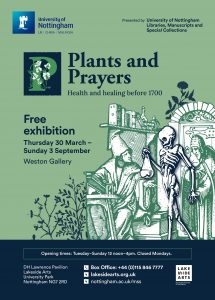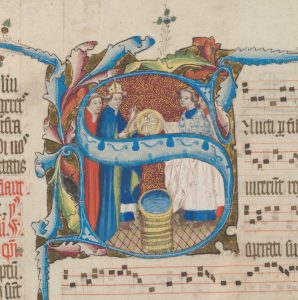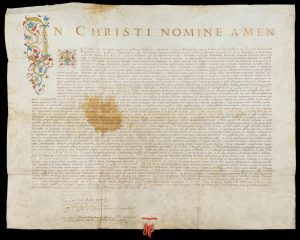April 30, 2023, by Kathryn Steenson
Plants & Prayers
 Healing is what makes us human – but concepts of health and methods of healing have changed much over time. Visitors to our latest exhibition Plants and Prayers: health and healing before 1700 will see how healthcare in the past was not just the domain of the physician: priests to apothecaries to housewives all provided different forms of care. The medical manuscripts and books tell us about diseases, treatments, the relationship between healer and patient, and the lengths to which people went to find cures. It showcases how attitudes to spiritual and physical illness and wellbeing have evolved over a millennium, but also how science is looking to medieval knowledge to solve modern medical issues.
Healing is what makes us human – but concepts of health and methods of healing have changed much over time. Visitors to our latest exhibition Plants and Prayers: health and healing before 1700 will see how healthcare in the past was not just the domain of the physician: priests to apothecaries to housewives all provided different forms of care. The medical manuscripts and books tell us about diseases, treatments, the relationship between healer and patient, and the lengths to which people went to find cures. It showcases how attitudes to spiritual and physical illness and wellbeing have evolved over a millennium, but also how science is looking to medieval knowledge to solve modern medical issues.
On display are a wide range of original documents from the archives and rare books held by the University of Nottingham’s Manuscripts & Special Collections, including herbals, seventeenth-century handwritten home remedies, and medieval deeds granting land and money to leprosy hospitals. The spectacular fifteenth-century Wollaton Antiphonal, an illuminated volume of religious music on loan from St Leonard’s Church in Wollaton, has made a rare public appearance. We have been fortunate enough to be display a unique fifteenth-century Middle English translation of Bernard of Gordon’s The Lylye of Medicynes, an Early Medieval medical text kindly loaned by The Bodleian Libraries, University of Oxford.

Detail from the Wollaton Antiphonal, showing a bishop blessing a bowl of bones believed to be relics, early 15th century. Ref: MS 250
Drawing primarily on the archives and rare books held in the medical and religious collections, this exhibition showcases how attitudes to spiritual and physical illness and wellbeing have evolved over centuries, but also how modern science may benefit from looking to medieval knowledge to address medical issues. In particular, the exhibition was inspired by the work of the Ancientbiotics team, of which the two co-curators, Dr Christina Lee and Dr Erin Connelly, are members. This is a cross-disciplinary team of medievalists and scientists aiming to investigate whether remedies from the Middle Ages could be adapted to help to find new solutions for modern problems, such as a rise in antimicrobial resistance.
Dr Lee, Associate Professor in Viking Studies in the School of English, said: “The exhibition shows that health is a central concern throughout history and that the desire to help and heal is innate in human beings. The aim of the exhibition is to showcase the world of pre-modern healing in which methods and understandings are different from our own.”
Plants and Prayers has been jointly curated by University of Nottingham Libraries, Manuscripts & Special Collections; Dr Christina Lee, University of Nottingham School of English; and Dr Erin Connelly, University of Warwick Life Sciences.
The exhibition will run from 30 March 2023 to 3 September 2023 at the Weston Gallery, Lakeside Arts Centre. More information is available at https://www.nottingham.ac.uk/manuscriptsandspecialcollections/exhibitions/plants-and-prayers.aspx
No comments yet, fill out a comment to be the first


Leave a Reply